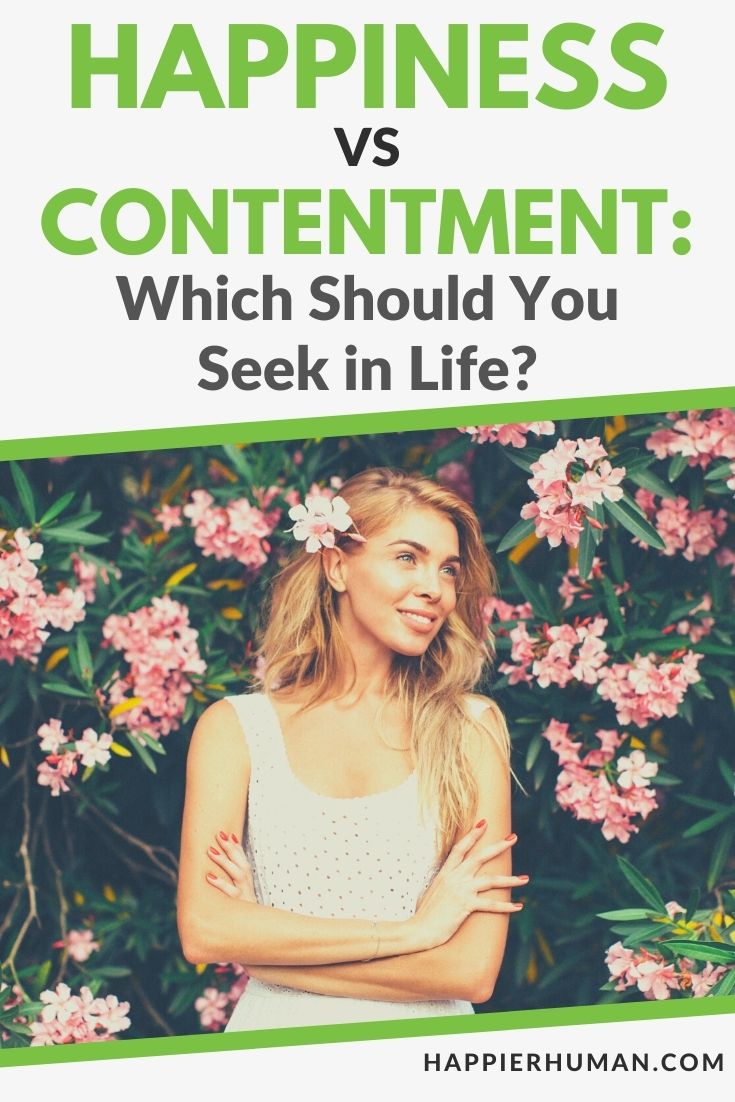There might be affiliate links on this page, which means we get a small commission of anything you buy. As an Amazon Associate we earn from qualifying purchases. Please do your own research before making any online purchase.
The pursuit of happiness is an exceedingly common idea… and one many people seek.
In fact, many people will spend much of their life on this pursuit… without ever really getting to where they want to be.
The search for happiness is a kind of shorthand for the notion of the freedom, knowledge or opportunity to achieve things in life that we want, crave, desire and need.
It is common to frame happiness as a situation, a set of assets or as a lifestyle we consider to be optimal.
As a form of shorthand, it is a useful way to communicate casually.
But is happiness real?
Is it even sustainable?
How can we understand the meaning of happiness without understanding contentment… and exploring the notion of happiness vs contentment?
In this article, I will discuss the meanings of happiness and contentment. My hope is for you to gain some important insights, as we strive to develop the wisdom needed to become truly content… rather than going through life chasing one empty pleasure after another.
(Side note: One of the best ways to increase your happiness and life satisfaction is to plan your day, so you focus on your TOP goals. To get started, watch this free video that details the 7-minute habit for planning your day to focus on what's important.)
What You Will Learn
- What is Happiness vs Contentment
- Happiness VS Contentment: Which Should You Seek in Life?
- 1. Happiness is Short Term & Contentment is a State of Being
- 2. Happiness vs Contentment in Relationships
- 3. Happiness vs Contentment in Health
- 4. Happiness vs Contentment in Our Professional Life
- 5. Happiness vs Contentment in Entertainment and Recreation
- 6. Happiness vs Contentment in Our Diet
- 7. Happiness vs Contentment in Awareness
- Final Thoughts on Happiness vs Contentment
What is Happiness vs Contentment
These terms are often conflated, confused and used interchangeably. This is not a problem in normal day-to-day conversation… but a concept that needs addressing nonetheless if we mean to live intentional and meaningful lives, rich in value and grace.
What is Happiness?
Happiness: a state of being satisfied, experiencing pleasure or enjoyment, and/or an absence of pain.
In its most common usage, it is interchangeable with contentment. But these are two very different things, as we will discover.
What is Contentment?
Contentment: a state of satisfaction that transcends the allure of basic needs and desires.
It is possible to be content, without being happy.
For example, you may hold a job other than the one you really hoped for. But if it is close or similar enough to your dream job… you may find satisfaction in it. Especially if we achieved it after considerable striving.
As human beings, we may find our jobs tolerable and be content for as long as it is wise to be.
Even if we dislike our job very much, we may find meaning in it if we use our earnings to feed our children. Support our families. Fund a charity. Or promote a noble cause.
That said… meaning, importance, purpose and a sense of a life mission being accomplished is a key ingredient in real, lasting contentment.
Conversely, it might help to think of the desire for happiness as being similar to the desire for food.
We have a very powerful compulsion to eat since we need to eat to live. However, we often want to continue eating even when we are full. Oftentimes, we do this because we crave the pleasure of eating.
This is understandable since eating is both necessary for life and is an activity that triggers more neural activity than nearly anything else we can busy ourselves with.
In the modern age of convenience food, it is quite common to fill up on foods that have little to no real nutrition. This leaves us feeling unsatisfied and drives us to continue eating, even if we know we should stop.
To understand contentment, we may consider the effect of learning to eat nutritious food only, and avoid empty calories.
When we do this, we can satiate our hunger. And over time, we can train our bodies and brains to crave real nutrition instead of empty calories.
The pursuit of happiness versus the development of contentment is very much akin to this.
We may seek happiness in distractions that are entertaining, relationships that are unhealthy, by consuming low-quality food and excessive amounts of alcohol… or we can develop, curate, and nurture contentment with healthy pursuits, meaningful sport and by seeking healthy and loving relationships.

As we move through life, we should be thinking in terms of whether we are acting on pleasure-seeking impulses… or whether we are working to develop meaningful and lasting contentment.
We should make our decisions on this basis.
This is not to say that seeking pleasure is all bad.
We may play a game, enjoy a dessert, have a cocktail, be intimate with another person… but we should not do so thinking that it will give us any kind of lasting satisfaction.
We should partake of pleasures with the intention of having an enjoyable experience that will be remembered… and use these moments as part of our strategy for building lasting, meaningful contentment.
For the remainder of this piece on happiness vs contentment, we will focus on understanding the difference between them. Rather than droning on about why you should curate and develop contentment, our hope is to throw everything we have at the task of providing the one example that will ring true for you.
That will bring the specific realization you need, as a unique individual, to take this lesson on board better than being lectured about mindful living.
Happiness VS Contentment: Which Should You Seek in Life?
There are many ways to understand the difference between happiness vs contentment.
One is sure to resonate best with you, inside of your one-of-a-kind life story. So I encourage you to find the example below that most impacts your life and your daily awareness… and focus on changing your decision-making process from a purely happiness/pleasure-seeking one, to one of building meaning and developing contentment.
1. Happiness is Short Term & Contentment is a State of Being
Happiness is what you feel when eating your favorite dish, experiencing intimacy with someone to whom you are attracted… or when you obtain a desired object.
But these are all temporary, and when we place too much stock in them, the pursuit of happiness becomes like chasing a rainbow.
Contentment is a state of mind we develop by engaging in meaningful pleasures, by serving humanity in some way and by creating long-term or lasting value.
2. Happiness vs Contentment in Relationships
It is all too common for people to compulsively seek relationships that are not ideal. Too often, we revel in the thrill of early encounters, courtship, and the “honeymoon” phase.
To build contentment, we need to seek union with people we both admire and have a deep sense of affection for.
This takes time, of course… but the alternative is the unending loneliness of a shallow romance.
3. Happiness vs Contentment in Health
In the fitness world, we often talk about the difference between “glamor muscles” and core muscles.
A man may want to build large biceps to look strong. There's nothing wrong with that, but when done to the exclusion of aerobic fitness… it is little more than superficial. And also not healthy for your heart.
By the same token, one might give up eating sugar, but continue to drink more alcohol than is advisable.
Alcohol turns to sugar in the liver; so once again, this is a misguided way to pursue fitness that will not nurture contentment.
4. Happiness vs Contentment in Our Professional Life
Some people get a kick out of just making large amounts of money, but most people earn money as a means of getting needs met and obtaining freedom.
If we find ourselves engaging in work that makes us unhappy, we're bound to damage our health. But more importantly, we are trading our precious living time for something we just spend on bills.
If possible, consider scaling back unsatisfying money-earning for time spent more meaningfully.
It could be spending more time with loved ones. It could be creating art. It could be simply watching the water ripple on the surface of a lake.
Few would argue that any of those things are much more contentment-building than completing TPS reports.
5. Happiness vs Contentment in Entertainment and Recreation
The phenomenon of video-game addiction was first recognized by psychology in the early 2000s.
Sufferers complain that they want to stop playing games, but cannot break themselves of the habit… and waste dozens of hours each week on an activity that keeps them from building a better life.

Of course, the same goes for watching television.
This becomes a problem when we simply engage in these activities compulsively in order to stave off boredom.
Drinking, smoking, thrill-seeking activities and other reckless behaviors are no different.
We must refuse to engage in recreational activities that have become a compulsive habit. Each time we fail at this, more meaning is drained from our lives and contentment eludes us again.
6. Happiness vs Contentment in Our Diet
At the risk of being redundant, I will talk about food a second time.
Hey, it’s my article. My moment.
With the processed-food-laden modern diet, it's critical that we get this under control… not just as individuals, but as a culture. We know that the foods which bring immediate pleasure often make us feel bloated, cause weight gain and trigger all manner of disease.
The more we succeed at opting for nutritious, natural food, the more we train our bodies not to crave low-grade poisons like refined sugar and chemically altered salt.
A good diet is key to true contentment.
7. Happiness vs Contentment in Awareness
Many dichotomies such as those discussed above stem from a failure to achieve what is often referred to as mindfulness.
We should endeavor to live in the moment, to develop a habit of quietly saying to ourselves, “This is happening now.” It doesn't mean we shouldn't plan for the future. It simply means we should be in the present moment as much and in every sense we can manage and understand.
One way to begin doing this is to simply pay attention to your breathing. Doing so will put your awareness into contact with your body. From there, soul-healing mindfulness is not far away.
Final Thoughts on Happiness vs Contentment
I’m guessing that something in this article on happiness vs contentment resonates with you.
And if you've made it this far, you clearly have the desire live your best and most enriching life.
A purposeful life.
You want to become make better choices. Become wiser, kinder and stronger in your convictions.
Now that you’ve read this, consider checking out this article on group activities that help us to develop mindfulness… for mindfulness can be your strongest ally in the pursuit of contentment.
We are social creatures.
The combination of harmonious relationships and mindfulness practices is a powerful tool in developing lasting contentment.
Finally, if you want to increase your happiness and life satisfaction, then watch this free video that details the 7-minute habit for planning your day to focus on what's important.


